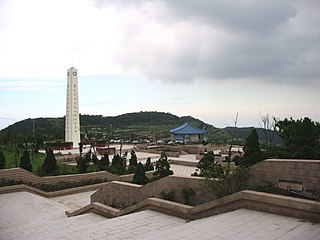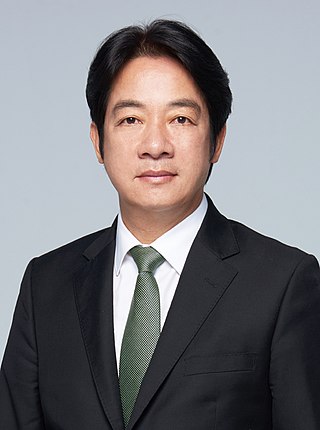
The president of the Republic of China, commonly known as the president of Taiwan, is the head of state of the Republic of China (Taiwan) as well as the commander-in-chief of the Republic of China Armed Forces. The position once had authority of ruling over Mainland China, but its remaining jurisdictions has been limited to Taiwan, Penghu, Kinmen, Matsu, and other smaller islands since the conclusion of the Chinese Civil War.

Yen Chia-kan, also known as C. K. Yen, was a Chinese chemist and Kuomintang politician. He succeeded Chiang Kai-shek as the 2nd president of the Republic of China on 5 April 1975, being sworn in on 6 April 1975, and served out the remainder of Chiang's term until 20 May 1978.

The Wuzhi Mountain Military Cemetery is Taiwan's most prominent military cemetery. The cemetery is located on Wuzhi Mountain (五指山) at an elevation of 699 metres (2,293 ft) in Xizhi, New Taipei City and borders Taipei City's Neihu District and Yangmingshan National Park. The cemetery has a wide open view ranging from the Taipei 101 over at Taipei's Xinyi District to the Keelung Harbor.

The vice president of the Republic of China, commonly referred to as the vice president of Taiwan, is the second-highest constitutional office of the Republic of China, commonly known as Taiwan.
Yangmingshan Administrative Bureau was a county level administrative body in Republic of China's Taiwan Province between 1949 and 1973.

The following outline is provided as an overview of and topical guide to Taiwan:

The Chung-Shan Building is part of the Sun Yat-sen Memorial Hall complex. Completed in 1966, the building is located in the Yangmingshan National Park in Taipei, Taiwan. The building is placed on the reverse of the 100 New Taiwan Dollar bill. The building was used as the meeting venue of the National Assembly and off limits to the general public until the National Assembly's suspension in 2005, and now serves as a location for hosting ceremonies by the President of the Republic of China for state visits and conferences.
Events from the year 1975 in Taiwan, Republic of China. This year is numbered Minguo 64 according to the official Republic of China calendar.
Events in the year 1969 in Taiwan, Republic of China. This year is numbered Minguo 58 according to the official Republic of China calendar.
Events from the year 1970 in Taiwan, Republic of China. This year is numbered Minguo 59 according to the official Republic of China calendar.
Events from the year 1972 in Taiwan, Republic of China. This year is numbered Minguo 61 according to the official Republic of China calendar.
Events from the year 1964 in Taiwan, Republic of China. This year is numbered Minguo 53 according to the official Republic of China calendar.
Events from the year 1967 in Taiwan, Republic of China. This year is numbered Minguo 56 according to the official Republic of China calendar.
Events from the year 1966 in Taiwan, Republic of China. This year is numbered Minguo 55 according to the official Republic of China calendar.
Indirect presidential elections were held in the Republic of China on March 22, 1954 to elect the President and Vice President. The vote took place at the Chung-Shan Hall in Taipei. Incumbent President Chiang Kai-shek was re-elected for the second term. The premier Chen Cheng was elected to be the Vice-President. These were the first elections that took place since the fall of the mainland to the Chinese Communist Party in 1949.

Indirect elections were held for the presidency and vice-presidency of the government of the Republic of China on Taiwan on March 21, 1960. The vote took place at the Chung-Shan Hall in Taipei. Incumbent President Chiang Kai-shek and Vice-President Chen Cheng was re-elected.

Indirect elections were held for the presidency and vice-presidency of the government of the Republic of China on Taiwan on March 21, 1966. The vote took place at the Chung-Shan Hall in Taipei. Incumbent President Chiang Kai-shek was re-elected for the fourth term with his Vice-President Yen Chia-kan.
Indirect elections were held for the presidency and vice-presidency of the government of the Republic of China on Taiwan on March 21, 1978. The vote took place at the Chung-Shan Building in Yangmingshan, Taipei. Premier Chiang Ching-kuo, son of former President Chiang Kai-shek, was elected as the President with Governor of Taiwan Province Hsieh Tung-min who became the first Taiwan-born Vice President.

Indirect elections were held for the presidency and vice-presidency of the government of the Republic of China on Taiwan on March 21, 1984. The vote took place at the Chung-Shan Building in Yangmingshan, Taipei. Incumbent President Chiang Ching-kuo was re-elected for the second term with Governor of Taiwan Province Lee Teng-hui as the Vice President.
Indirect elections were held for the presidency and vice-presidency of the government of the Republic of China on Taiwan on March 21, 1990. The vote took place at the Chung-Shan Building in Yangmingshan, Taipei. Incumbent President Lee Teng-hui was elected, with Secretary-General to the President Lee Yuan-tsu as the Vice President. It was the last indirect presidential election in Taiwan.








